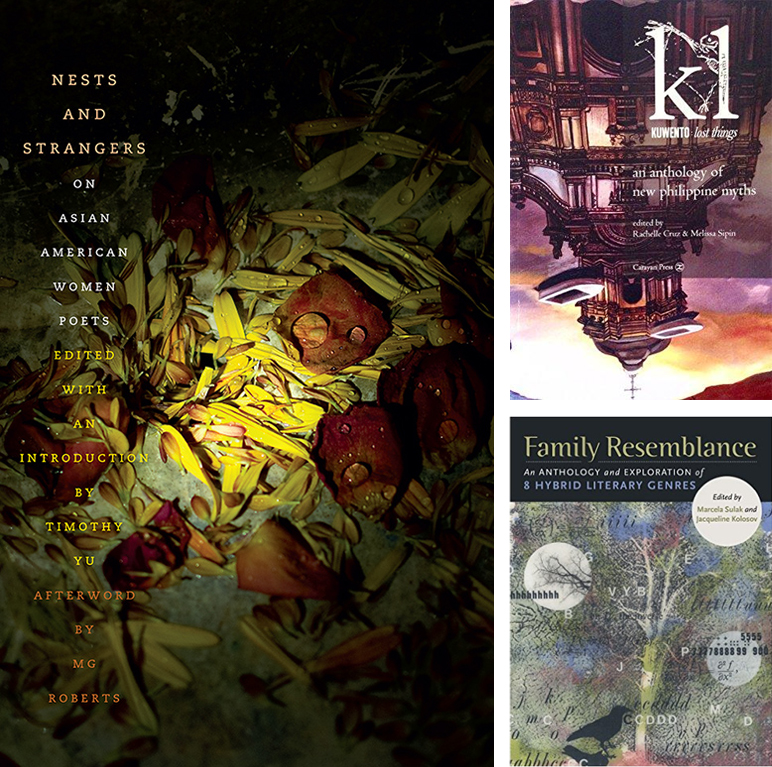
It may still officially be summertime, but for those of us who balance our writing lives with scholarship and/or teaching, it’s already time to hang up the vacation gear and dust off the books in preparation for a new academic year. Thus far in this summer’s series of reading recommendations, we’ve brought you a couple of short critical reflections that have teased out thematic similarities between some recent collections by #ActualAsianPoets, but this month, in honor of back to school, we’re highlighting a three recent anthology titles (or to be technical, two anthologies and one edited collection of critical prose) that feature #ActualAsianPoets and that we think would be wonderful editions to the classroom this semester.
Kuwento: Lost Things: An Anthology of New Philippine Myths, edited by Rachelle Cruz and Melissa Sipin (Carayan Press, 2014)
Weaving together poetry, prose, and visual art, Kuwento, whose title means “story” in Tagalog, explores the notion of myth as told and retold by voices from the Philippine diaspora. Writes coeditor Melissa R. Sipin in a blog post on Kweli, “It is with this book we hope the invocation of the past is somehow answered, somehow quelled, somehow excavated, and thus reborn—reborn in our own terms, in our own myths, in our own kuwentos.” Containing selections by M. Evelina Galang, Oliver de la Paz, Sarah Gambito, Joseph Legaspi, Barbara Jane Reyes, Brian Ascalon Roley, Aimee Suzara, Eileen Tabios, Nick Carbó, and others, Kuwento appears to be both thoughtfully curated and expansive in its scope. We’d be eager to see it added to syllabuses for Asian American or Filipino Literature courses and workshops on the undergraduate or graduate levels. As with other groundbreaking anthologies such as How Do I Begin? (the seminal Hmong American anthology that we reviewed a few years ago) or Indivisible (the first anthology of South Asian American poetry, which we reviewed here and here), Kuwento could also likely work well in a community workshop context and perhaps even (in excerpted form) for younger students.
Nests and Strangers: On Asian American Women Poets, edited and with an introduction by Timothy Yu; afterword by Mg Roberts (Kelsey Street Press, 2015)
In this slim but mighty volume, Timothy Yu brings together four critical essays by female Asian American literary scholars, each of which focuses on a different pioneering Asian American women poet. Exploring the life and work of Myung Mi Kim, Nellie Wong, Mei Mei Berssenbrugge, and Bhanu Kapil, Nests and Strangers draws together thoughts on both the biographies and aesthetic impulses of each poet in order to better understand the import (and impact) of each of their poetry. It would be a wonderful resource for an advanced undergraduate seminar, especially for one focused on feminist poetics or Asian American literature.
Family Resemblance: An Anthology and Exploration of 8 Hybrid Literary Genres, edited by Marcela Sulak and Jacqueline Kolosov (Rose Metal Press, 2015)
Though not specifically an Asian American literature-focused anthology, Family Resemblance encompasses a diverse selection of literary voices, including a number of notable Asian American and Pacific Islander ones (e.g., Kazim Ali, Jenny Boully, Craig Santos Perez). The notion of hybridity is, of course, one that we explored in some depth in our fifth issue, and especially when contextualized with the metaphor of inheritance, as in this anthology, formal hybridity has unmistakable thematic resonances for scholars and students of ethnic studies and postcolonial studies. Personally recommended by our associate editor, Mia, Family Resemblance would fit well into almost any workshop setting (especially one exploring experimental or nontraditional forms) and would also be a wonderful means by which to diversify a syllabus and open doors for deeper consideration of issues of race, class, and gender in the university classroom.
* * *
For those of you who are teachers, what diverse books are you including on your syllabuses this term, and what are some APIA-focused anthologies or critical collections you’ve taught that you’ve found to be especially successful? And if you’re a student, what are your dream APIA lit reading assignments for an inclusive workshop or literature course experience? We’d love to hear from you! Please tell us in the comments or chat with us about it on Twitter, Facebook, or Instagram (@LanternReview).
Happy August to all of our readers, and to everyone who’s headed back to school soon, we wish you a smooth transition and a fulfilling academic year!